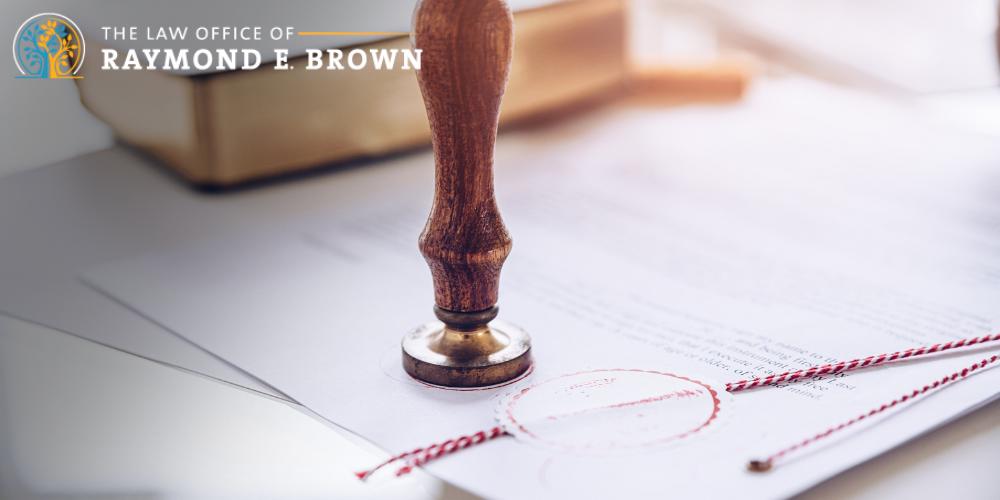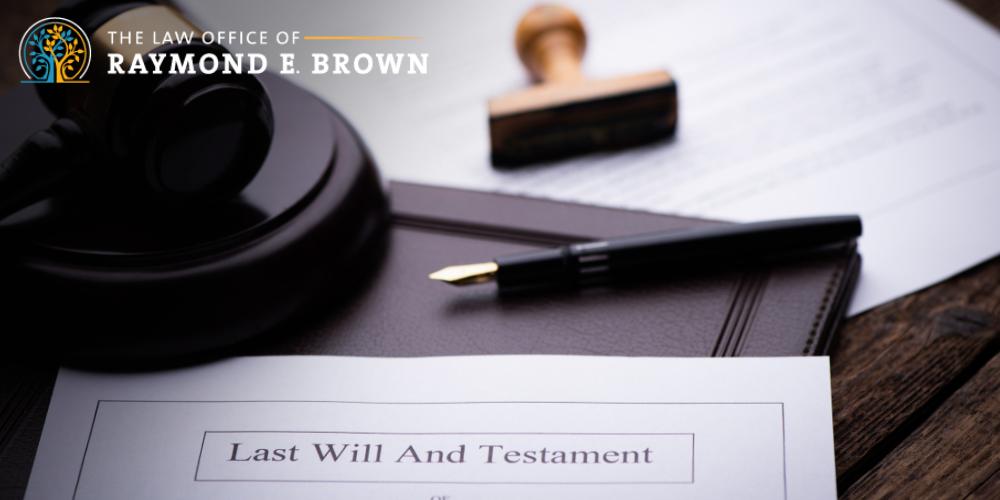Pour-Over Will in Maryland
Home > Pour-Over Will
Annapolis Estate Planning Attorney Assisting With Pour-Over Wills
Experienced Pour-Over Will Lawyer Serving Anne Arundel County, Washington D.C., and Beyond
In Maryland, pour-over wills serve as an essential component of a well-structured estate plan, particularly when not all assets have been transferred into a trust. At The Law Office of Raymond E. Brown, our Annapolis will attorneys specialize in crafting these documents to serve as a bridge between your will and your trust, funneling any assets not already included in your trust directly into it upon your passing.
As a seasoned Maryland estate planning attorney, Raymond E. Brown understands the unique intricacies of Maryland law and the importance of ensuring that every aspect of your estate is carefully accounted for. A pour-over will acts as a safety net, capturing any overlooked assets and directing them to your trust, which can then be distributed to your beneficiaries according to the terms you’ve set. This strategy not only simplifies the administration of your estate but also provides the peace of mind that comes from knowing your estate plan is comprehensive and complete.
To learn more about creating a pour-over will in Maryland, call our law offices at (443) 554-9944 or contact us online to schedule a consultation today.

What is a Pour-Over Will?
A pour-over will is a specialized estate planning instrument designed to ensure that any assets not explicitly included in a trust are transferred, or “poured over,” into the trust upon the death of the testator (creator of the will). The primary purpose of a pour-over will is to catch any “loose ends” or assets that were not placed into the trust during the testator’s lifetime, either due to oversight or because they were acquired too close to the testator’s death to be included.
Pour-Over Will vs. Traditional Will
A pour-over will differs from a standard will in its intended function and interaction with other estate planning tools, particularly trusts.
A traditional will is a standalone document that outlines all your assets should be distributed upon your death. It serves as a comprehensive guide for the probate court to distribute the decedent’s estate directly to the named beneficiaries.
Meanwhile, a pour-over will is often used in conjunction with a living trust—a separate estate planning tool that holds assets to avoid a probate proceeding. The pour-over will does not detail the distribution of assets to beneficiaries, but rather states that any remaining assets outside the trust at the time of the individual’s death should be transferred into the trust. Once inside the trust, the assets are distributed according to the trust’s terms, not the will’s. This process aims to ensure that all leftover assets are eventually placed under the trust’s control, potentially benefiting from the trust’s privacy and avoiding the probate process, which can save time and maintain confidentiality.
Pour-Over Will vs. Revocable Living Trust
Pour-over wills and revocable living trusts are complementary estate planning tools, but they serve different purposes and operate differently.
A revocable living trust is an estate planning tool that holds an individual’s assets during their lifetime. The grantor—the person who creates the trust—can change or revoke the trust at any time before their death. A revocable trust is managed by a trustee for the benefit of the beneficiaries named in the trust document. One of the primary advantages of a revocable living trust is that it allows the trust assets to bypass the Maryland probate process, providing for a quicker, private, and more efficient transfer of assets.
On the other hand, a pour-over will is a type of will designed to work in tandem with a revocable living trust. While the pour-over will itself must go through probate, once the assets are transferred to the trust, they can then be distributed to the beneficiaries outside of this time-consuming process.

How Do Pour-Over Wills Work?
When a pour-over will is enacted, it directs that any assets not already in the trust at the time of the individual’s death should be transferred into the trust. This includes assets that the individual may have acquired after the trust was created or assets that were never formally placed into the trust for various reasons.
The process begins when the personal representative (or executor)—often named in the will—administers the estate through Maryland’s probate court. They are tasked with collecting and managing the deceased’s assets, paying debts and taxes, and then distributing what remains. For assets outlined in the pour-over will, the personal representative will transfer them to the trust, at which point the successor trustee takes over, bypassing the need for further probate proceedings for those particular assets.
Who Benefits the Most From a Pour-Over Will?
A pour-over will is particularly beneficial for individuals who continue to acquire new assets after they have already established a living trust. This will acts as a catch-all to ensure that any other assets acquired later in life, which are not directly titled in the trust, are ultimately included in the trust when they die. This is crucial for those who may not have the time or foresight to continually update their trust agreement with each new asset they acquire.
Those who experience major life events—such as marriage, divorce, the birth of a child, or the death of a family member—may also find a pour-over will particularly beneficial. It allows them to revise their overall estate plan without the need to make detailed adjustments to the trust each time their wishes change. Instead, they can simply update their pour-over will to reflect their current intentions.
Further, for individuals who have specific wishes about directing certain assets into particular trusts–such as to address different family needs or to support charitable causes, for example–a pour-over will can ensure that these specific intentions are honored, funneling assets precisely where they are intended to go.

Does a Pour-Over Will Avoid Probate?
Probate is the legal process through which the will is validated, the estate is settled, and the assets are distributed according to the will’s instructions. A pour-over will does not, by itself, avoid probate. In fact, assets that are transferred to a trust through a pour-over will generally must first go through the probate process. This is because the assets were not titled in the name of the trust at the time of the individual’s death.
Once again, the primary purpose of a pour-over will is to ensure that any assets not already placed in a trust will eventually be distributed according to the terms of the trust. However, because these assets were not titled in the trust at the time of death, they must be probated before they can “pour over” assets into the trust.
The key to avoiding probate is to ensure that all assets are titled in the name of the trust or are designated to transfer to the trust upon death, such as through beneficiary designations. Trusts themselves, when properly funded, do avoid probate because the assets within them are owned by the trust and can be transferred to beneficiaries without court intervention.
As such, while a pour-over will is a useful tool in an estate plan, it should be part of a broader strategy that includes funding the trust with assets during one’s lifetime to truly avoid probate.

What are the Advantages of a Pour-Over Will?
There are a number of advantages that come with creating a pour-over will. These include:
- Simplicity: It simplifies the estate planning process by serving as a catch-all document that ensures all assets are distributed according to the terms of an existing trust.
- Privacy: Once assets are transferred to a trust, they are distributed privately according to the trust terms, avoiding the public process of probate for those particular assets.
- Consistency: It ensures that all assets, even those not originally placed in the trust, are managed under the same set of instructions, providing consistent management and distribution.
- Flexibility: It can be easily updated to reflect changes in assets without the need to modify the trust document directly.
- Control: It allows for continued control over the distribution of assets after death, as the trust can be structured to distribute assets over time or under certain conditions.
- Protection: Trusts can offer protection against creditors and legal challenges, which is extended to all assets funneled into the trust via the pour-over will.

How To Create a Pour-Over Will in Maryland
Creating a pour-over will is a process that should be approached with careful consideration and legal guidance to ensure that it aligns with state laws and personal estate planning goals. It often begins with a comprehensive review of your assets, including those already placed in trusts and those that remain outside.
Once you have a clear picture of your assets, the next step is to work with a skilled estate planning attorney like Raymond E. Brown. An attorney with a deep knowledge of Maryland’s estate planning laws can provide invaluable assistance in drafting a pour-over will that complements your trust arrangements and ensures that all assets will be properly funneled into the trust upon your death.
At The Laws Offices of Raymond E. Brown, our Annapolis estate planning attorneys can also help you understand the nuances of Maryland law, assist in the creation or updating of trusts if necessary, and ensure that your pour-over will is legally sound and reflects your wishes. We will also guide you through the process of properly executing the will, which in Maryland requires it to be signed in the presence of disinterested witnesses and notarized.
The importance of working with an attorney like Raymond E. Brown cannot be overstated. Estate planning is a complex area of law, and the stakes are high. An experienced estate planning attorney ensures that your pour-over will is not only a valid legal document but also an effective part of a larger estate plan that will provide for your loved ones and ensure your legacy is preserved.

Interested in Incorporating a Pour-Over Will into Your Estate Plan? Call The Law Office of Raymond E. Brown Today
If you need assistance with creating, updating, managing, or executing a pour over will or other estate planning legal documents, The Law Office of Raymond E. Brown can help.
Specializing in elder law and estate planning matters in Maryland, our renowned law firm provides you with the peace of mind that your legacy is protected.
Don’t leave the future of your estate to uncertainty. Reach out to The Law Office of Raymond E. Brown for a personalized approach that ensures a seamless transition for your loved ones. Contact us today at (443) 554-9944 for a free consultation.

